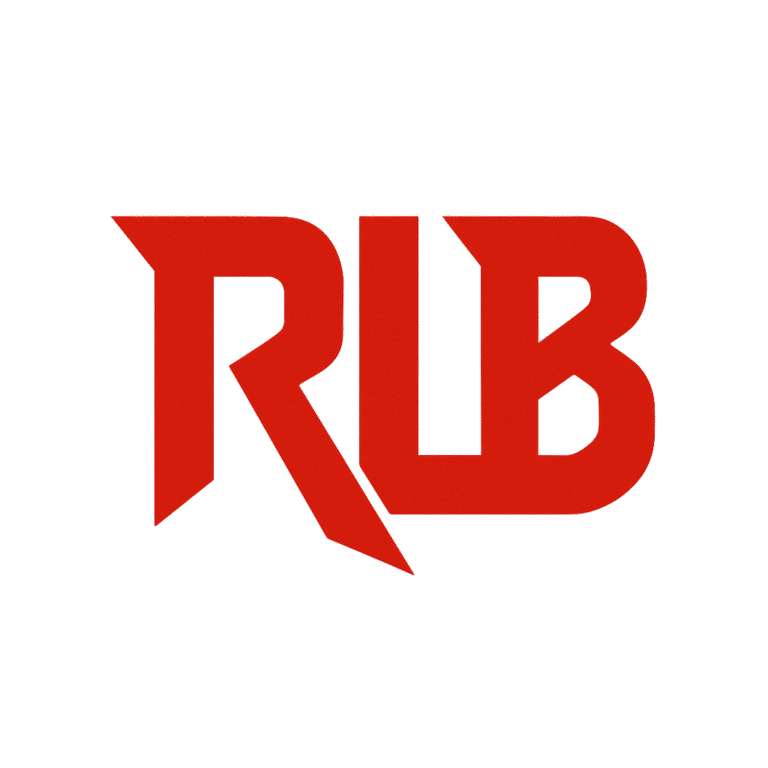
Sourcing from China feels like a gamble. You need quality cutting wheels, but you worry about unreliable suppliers and inconsistent products. This uncertainty can cost you time and money.
The best way to find a cutting wheel manufacturer in China is to focus on industrial hubs like Henan province, verify international certifications like ISO 9001 and MPa, and partner with experienced B2B suppliers who offer OEM/ODM services and can provide clear technical specifications.

Finding a good supplier seems tough, but it’s not impossible. You just need to know where to look and what questions to ask. I’ve been in this business for nearly three decades, and I can walk you through the process. We will look at who the key players are and how you can confidently choose the right partner for your business.
Who are the leading manufacturers of cutting wheels in China?
You hear about all these Chinese factories, but you don’t know who is truly reliable. This search can be frustrating when you need quality products for your business.
Leading manufacturers often specialize in certain types of abrasives. Some focus on conventional wheels for metal, while others excel in superhard diamond blades for stone. Many of these top companies, including my own, supply well-known international brands and hold key certifications for quality and safety.

The term "leading manufacturer" can mean different things depending on your needs. A company that leads in super-thin resin discs might not be the leader in diamond grinding wheels for precision engineering. The Chinese abrasive market1 is incredibly diverse. Some factories mass-produce general-purpose wheels, while others, like my own company Reliable, have built their reputation on specialized, high-performance products.
Diverse Specializations
You have to match the manufacturer’s specialty to your application. A supplier for the construction industry might focus on large-diameter diamond blades2 for concrete, while a supplier for the automotive industry will produce high-precision grinding wheels3. We, for example, cover a wide spectrum. We manufacture both superhard products4 like diamond and CBN wheels and conventional abrasives like corundum cutting discs. This allows us to serve clients with very different needs, from high-precision machining to heavy-duty fabrication.
A Look at Some Notable Players
China has many strong manufacturers, especially in key industrial regions. Here are a few examples to give you an idea of the landscape:
| Company Name | Specialization | Key Features |
|---|---|---|
| Changzhou Duomeng | Cutting wheels, ultra-thin cutting discs | ISO9001, MPa, CE certified. Supplies brands like Stanley. |
| Anhui Ruilaibo Technology | Diamond saw blades, grinding wheels | Focus on ceramic and stone cutting. |
| Zhejiang Jinhua CU MET | Metal cutting wheels, grinding wheels | Offers OEM/ODM services for stainless steel and cast iron. |
| Yongkang Yongbang Abrasives | Cutting wheels, polishing wheels | Specializes in custom products for metalworking. |
| Henan Yimeng Abrasives | Diamond/CBN grinding wheels, diamond powder | High-precision wheels for hard alloy tools. |
| Xingtai Shuangjian Resin Wheel | Durable metal cutting wheels | Supplies industrial clients like shipyards and foundries. |
This is just a small sample. The key is to look beyond the name and understand their core business.
How can I find reliable abrasive suppliers in China?
You are ready to source cutting wheels, but the fear of dealing with a bad supplier is holding you back. This hesitation can stop you from getting better products and prices.
To find a reliable supplier, start with industrial clusters like Henan province. Always verify their credentials, such as ISO 9001 certification. Ask for product samples and check their experience with international B2B clients, especially those who offer OEM and ODM services.

Finding a partner you can trust is the most important step. Don’t just look for the lowest price. A reliable supplier is an investment in your own production quality. From our experience at Reliable, building long-term relationships is everything. We only do B2B business because we want to be partners, not just sellers. Here is a simple process to follow.
Start with Industry Hubs
Focus your search on regions known for abrasives. These areas have a complete supply chain, a skilled workforce, and intense competition that drives up quality. My factory is in Henan province5, and being here means we have direct access to the best raw materials and an environment of constant innovation.
Vet Their Credentials and History
A serious manufacturer will have their credentials ready. Look for quality management6 certifications like ISO 90017. Also, check how long they have been in business. My factory, for instance, has been perfecting its craft for nearly 30 years. That kind of experience teaches you things you can’t learn from a textbook. It builds integrity and a deep understanding of what global customers need.
Request Samples and Technical Data
Never place a bulk order without testing the product. A confident supplier will be happy to provide samples. When we get an inquiry from a potential partner, sending samples is a standard part of our process. We want you to see and feel the quality. Also, ask for a Technical Data Sheet (TDS) that details the product’s composition, recommended usage, and performance specifications.
Evaluate Communication and Support
Good communication is essential, especially in international trade. Does the sales representative understand your technical requirements? Do they respond promptly? A reliable partner will feel like an extension of your own team. They should be able to provide technical support if you run into any issues.
Which Chinese regions are known for producing high-quality cutting wheels?
You know China is a manufacturing giant, but where should you even begin to look? Sourcing from the wrong area can lead to higher logistics costs and lower-quality goods.
Henan province is the heart of China’s abrasives industry, producing 80% of the nation’s diamonds. Other important regions include Zhejiang, known for its hardware tools, and Hebei, which has a strong base in resin-bonded wheel manufacturing. Each region has its own unique strengths.

Location matters a lot. A factory’s region often defines its access to raw materials, its level of specialization, and the competitive landscape it operates in. Understanding these regional differences will make your search much more effective. As a manufacturer based in Henan, I can tell you firsthand why this region is so dominant.
Henan: The Abrasive Heartland
Henan isn’t just a leader; it’s the core of the entire Chinese abrasives supply chain. With 80% of the country’s industrial diamond supply coming from here, factories like mine have a huge advantage. We have first-pick access to high-quality raw materials at a stable cost. The competition here is fierce, which means only the best survive. After nearly three decades, we’ve proven our quality and integrity to become a leading national manufacturer. For buyers seeking a serious, long-term B2B partner, Henan is the best place to start.
Zhejiang: The Hub of Hardware Tools
Cities in Zhejiang province, like Yongkang and Jinhua, are famous for hardware. Their manufacturing ecosystem is geared toward producing a wide variety of tools, including cutting wheels. These factories are often very experienced in OEM/ODM services and are adept at producing for international consumer brands. If you’re looking for a supplier for a diverse range of hardware tools and not just specialized abrasives, Zhejiang is a strong choice.
Other Key Regions
Other provinces also have their own abrasive specialties. For example, Xingtai in Hebei province is well-regarded for its production of resin-bonded grinding and cutting wheels. Guangdong province is another major manufacturing and export hub, with many factories that integrate abrasives into finished tools and machinery.
| Region | Primary Strength | Best For Buyers Looking For… |
|---|---|---|
| Henan | Raw Materials (Diamond), Specialized Abrasives | High-performance, specialized B2B abrasive solutions. |
| Zhejiang | Hardware Tools, OEM/ODM Flexibility | A wide variety of standard cutting wheels and other tools. |
| Hebei | Resin-Bonded Wheels | Specific types of conventional grinding and cutting wheels. |
What quality standards should I look for when sourcing cutting wheels from China?
You see certifications like ISO 9001 or MPa on a product, but what do they actually mean for you? Buying without understanding these standards is a risk to safety and performance.
When sourcing, prioritize key international standards. ISO 9001 confirms the factory has a reliable quality management system. The MPa seal (from Germany) is crucial for safety, ensuring the wheel won’t fail under stress. CE marking is necessary for selling in the European market.

These certifications aren’t just logos on a box. They are proof that a manufacturer has invested in their processes and is committed to meeting global safety and quality requirements. As a factory owner exporting our RL brand products worldwide, we treat these standards as non-negotiable. They are a promise to our customers that our products are safe, reliable, and consistent. Let’s break down what the most important ones mean.
ISO 9001: The Foundation of Quality
ISO 9001 is a certification for a company’s quality management system. It doesn’t certify the product itself, but rather the process of making it. A factory with an ISO 9001 certificate has documented procedures for everything from handling raw materials to final inspection. This ensures consistency. It means you can expect the 10,000th cutting wheel you order to be the same quality as the first one.
MPa Certification: The Gold Standard for Safety
For abrasives, this is one of the most important certifications. The MPA (Materialprüfungsamt) Hannover in Germany is a leading authority that tests the safety of abrasive products. An MPa-certified cutting wheel has been rigorously tested for things like side load strength and burst speed. It’s a guarantee that the product meets the highest European safety standards and is safe to use when operated correctly. We ensure our relevant products carry this mark, especially for our European clients.
CE Marking: Your Access to the European Market
The CE mark indicates that a product complies with the health, safety, and environmental protection standards for products sold within the European Economic Area (EEA). It’s not a quality mark, but a declaration of conformity. If you plan to sell your products in Europe, your supplier’s cutting wheels must have a CE mark.
Beyond Certifications: Ask for the Details
Certifications are the baseline. A truly reliable supplier will provide you with detailed technical specifications. You should ask about:
- Abrasive Grain: Is it aluminum oxide, silicon carbide, zirconia, or diamond?
- Grit Size: This determines the finish and speed of cut.
- Bonding Agent: The resin bond affects the wheel’s hardness and lifespan.
- Reinforcement: How many layers of fiberglass mesh8 are used for safety?
A good partner will work with you to match these specs to your exact application.
Conclusion
Finding the right cutting wheel manufacturer in China is simple if you are systematic. Focus on key regions like Henan, demand to see certifications, and partner with experienced B2B suppliers.
-
Explore trends and insights into the Chinese abrasive market to make informed sourcing decisions. ↩
-
Discover the applications and benefits of using diamond blades in various cutting tasks. ↩
-
Discover the variety of grinding wheels offered by Chinese manufacturers and their specific uses. ↩
-
Learn about superhard products and their applications in high-performance cutting tasks. ↩
-
Learn why Henan is the heart of China’s abrasives industry and its advantages for sourcing. ↩
-
Explore the principles of quality management and its importance in manufacturing processes. ↩
-
Understand the significance of ISO 9001 certification in ensuring product quality and reliability. ↩
-
Learn how fiberglass mesh reinforcement contributes to the safety and durability of cutting wheels. ↩
Written by
leeon
You may also be interested in:
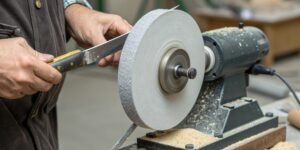
How to use a hard felt bench grinding wheel on knives?
Getting a razor-sharp, polished edge on a knife can be frustrating and slow. A dull knife is dangerous, and using the wrong tool can easily
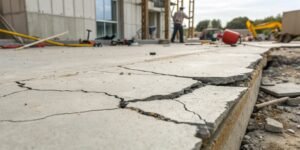
What are grinding cracks and how do you stop them?
Are tiny cracks appearing on your ground surfaces? This problem leads to part failure, wasting time and money. You can solve it by understanding the
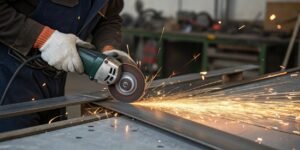
What does an angle grinder do that other tools can't?
Struggling with tools for multiple tasks? Carrying a heavy toolbox is inefficient. An angle grinder replaces many tools, saving you time and effort on the
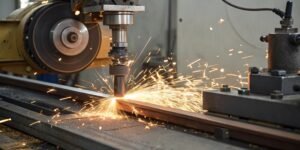
How to reduce the cycle time in a grinding machine?
Is your grinding process a major bottleneck? Slow cycle times hurt your bottom line and delay deliveries. You can speed up production by optimizing key

Do you regularly sharpen your chisels? If so, how?
A dull chisel ruins wood and causes frustration. This wastes time and expensive materials. Learning to sharpen correctly is the simple, game-changing solution you need
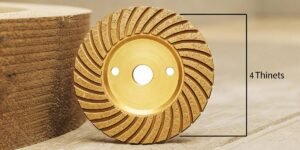
How is a grinding wheel specified?
Confused by the codes on a grinding wheel? Making the wrong choice costs money and ruins parts. Let me show you how to read them
